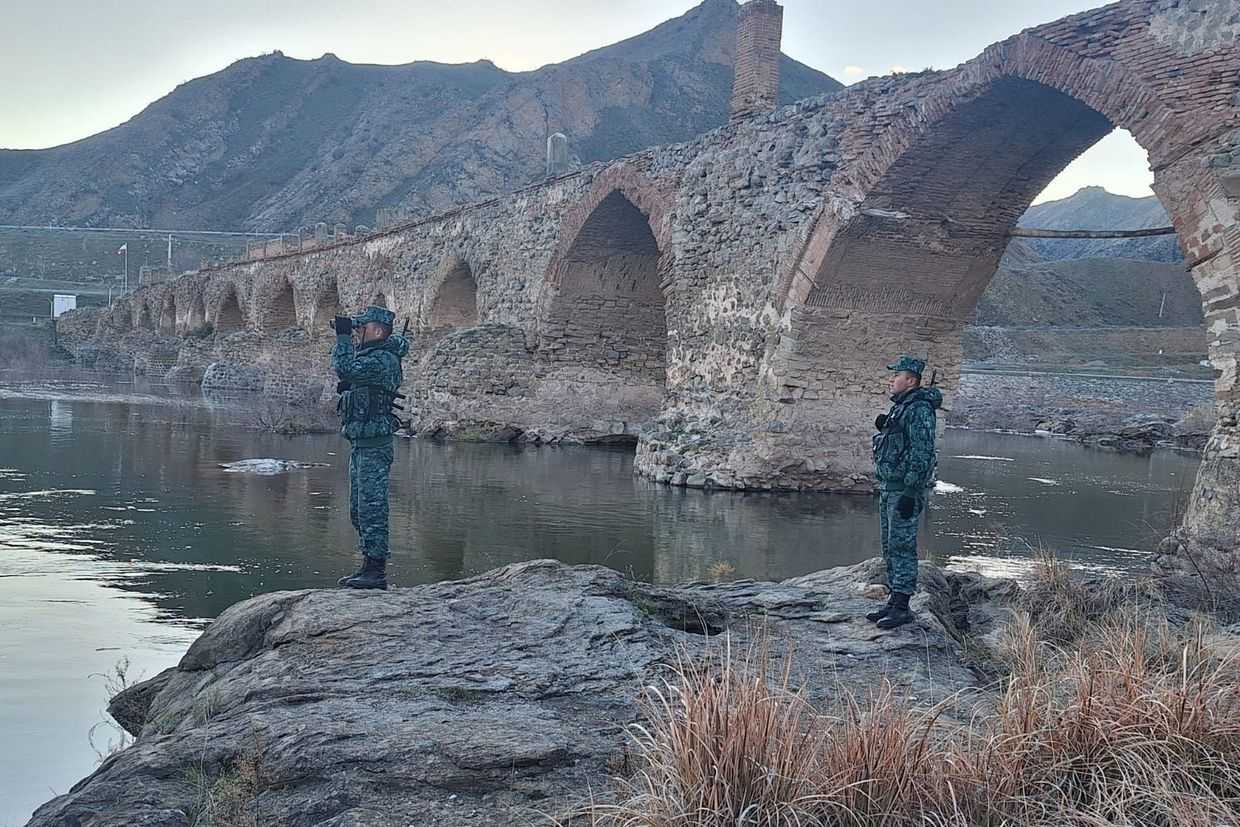
An independent environmentalist group, Ecofront, disclosed illegal activities of more than 20 falconers, during the non-hunting season. Only a few connected falconers’ high profile status with corruption.
Ecofront is an eco-activist group that investigates and campaigns against environmental crime and abuse in Azerbaijan. Their campaign this spring uncovered ongoing illegal hunting of little bustards, the caucasian crane (of which only up to 250 pairs remain in the wild), and the black-bellied sandgrouse in the Gakh State Nature Sanctuary.
According to the International Union for Conservation of Nature, some of these birds are listed in Azerbaijan’s red book of endangered species.
Plenty of photo and video evidence was filmed by the group and the hunters themselves, who happily documented their adventures on social media.
The activists were quick to expose the visitors’ identities. The poachers turned out to be Sheikh Zayed Abdulla Bin Mohamed Bin Butti Al Hamed, the chair of Abu Dhabi’s department of health, his brother Saif, and the Qatari poet and falconer Hamad al-Jamila, among others.
This group has been involved in falconry and rifle hunting in Azerbaijan throughout the month of March, despite the official hunting season already having ended.
The actions of the Sheikh and his entourage caused understandable public outrage, but these criticisms were consistently shot through with unsubtle racist overtones, especially in the media, where blame was entirely placed on the tourists, with no mention of corruption or other systemic issues.
Meanwhile, at the same time as it called on global conservationist communities to support their advocacy work, in local publications and press releases, Ecofront also repeatedly framed the issue as one concerning ‘Arabs’.
A shallow critique
It is readily apparent that the Ministry of Natural Resources and Environment could not, or did not want to take the necessary measures to halt the activity of such VIP visitors.
In terms of condemnation, all they could muster was a statement in which they said that the foreign tourists had been fined for cruelty to pigeons while training their falcons on private property.
Of course, the fact that Azerbaijan’s borders were closed when the visitors arrived and tourist visas were not being granted due to the pandemic only raises additional questions. Not to mention that local shepherds also cannot possess hunting rifles in this area due to the gazelle population and when caught hunting illegally, they are usually subject to swift punishment.
How did the tourists manage to get their hands on weapons illegally? Access to the Ajinohur area is indeed free, yet bringing weapons and hunting is strictly prohibited by law.
Unfortunately, all these issues are usually sidelined in the face of vulgar racism which refocuses attention from questions of power, privilege, and governance to that of ethnic identity.
Even when systemic questions are raised, such as those by Ecofront leader Javid Gara, who has been vocal about the immediate need to punish responsible officials and to end the selective and arbitrary application of the law, they are pulled down by the stressing of the poachers’ nationality.
Without understanding how wealth and power, in this case of a high-ranking member of the government of Abu Dhabi, interacts with the rule-of-law (or lack thereof) in Azerbaijan a proper indepth systemic critique is dumbed down by a simplistic narrative of nationalism.
Eco-hypocrisy
In 2016, Quartz and the Washington Post reported on Bin Butti Al Hamed’s ownership of Green Mile Safari, a company organising hunting expeditions, that had been kicked out of Tanzania due to numerous instances of animal torture and violations of Tanzanian wildlife laws. This information is freely accessible online, yet Azerbaijani media has not mentioned it.
No mention of the illegal hunting of wild birds came out of the Ministry of Ecology even after the Sheikh’s visit. When two people were fined ₼ 4,000 ($2,350) the pitifully low sum, especially for Sheikh who flies falcons from Abu Dhabi to Baku for 500$ each, angered many in the country, but representatives from Ecofront seemed to welcome the fine, ultimately, as a win.
Understanding how scarce the human resources are for eco-activism in Azerbaijan, it is confusing to observe the sorts of double standards that allow a group like Ecofront to thank the country’s leadership for acts that barely even mimic accountability.
While there are no real measures taken that would prevent such incidents from reoccurring, activists put themselves into a pre-losing position and choose to cooperate with officials who rather imitate reforms than take concrete action to bring sustainable solutions.
‘Hunting tours have been going on for more than 10 years’, said one Facebook user, whose comment went viral on Azerbaijani social media. According to him, for $2,500 per person a hunting trip can be organised with the Ministry of Ecology who then oversee and organise the trip.
Some have connected the skyrocketing amounts of travel from the Gulf, especially over the last five years, with the simplification of Azerbaijan’s visa process for many Middle Eastern countries back in 2017 — from which point the hunting business in Azerbaijan has blossomed.
This too must be connected with deeper systemic issues. The drastic devaluation of the national currency and decrease in the oil prices over the past decade naturally forced Azerbaijan to new revenues through the development in tourism, which immediately progressed into shameless poaching.
National ecology
The subsumption of diverse issues into a nationalist discourse in domestic politics is not a phenomenon that belongs to Azerbaijan alone. The partition between limited ecological objectives at home and the voicing of the necessity of an international green movement to tackle existential challenges like climate change is sadly all too common.
Of course, some of the eco-activists, including the Ecofront group, understand this. At the same time, such groups also depend on local donations and have limited resources to address the local issues they are advocating for.
Oil production, the main economic driver of Azerbaijan, remains unchallenged, and is a large part of the reason that environmental issues are rarely challenged at the state level. As such, Ecofront has never campaigned to expose the destruction of wildlife and biodiversity, pollution, degradation of land, and various ecosystems that are part and parcel of the process of oil extraction and processing.
Worse still, Azerbaijan is an authoritarian country known for repeated violations of human rights, especially of those who voice dissent. Talking about anything that is even remotely similar to political ecology would potentially mean endangering one’s life and freedom.
This unwillingness to profoundly challenge the Azerbaijani state and economic system, along with the failure to establish a comprehensive movement from scattered and sporadic groups active on localised issues, gives rise to the question of the purpose of ecoactivism in Azerbaijan — other than making certain members of the movement famous.
In truth, this is nothing new. We saw an even worse manifestation of this during the 2020 Nagorno-Karabakh war, in which one barely heard a peep about the environmental impacts of the war. Ultimately, in Azerbaijan the environment is subordinate to the national interests and does not matter beyond the country’s borders.
The opinions expressed in this article are the author’s alone, and do not necessarily reflect the views of OC Media’s editorial board.








